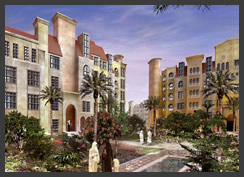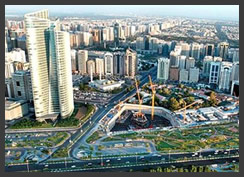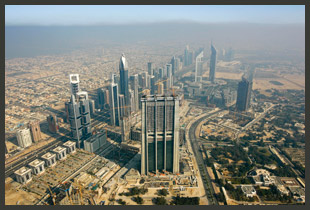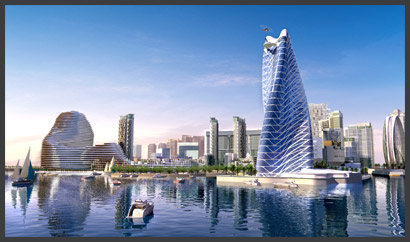UAE Real Estate UAE has become a Real Estate powerhouse
The real estate sector of the UAE has become the backbone of its non-oil economy. While Abu Dhabi, home to nine percent of the world’s proven oil reserves, does not really rely on sky-scrapers boom-down Dubai does. Oil is just one of many sectors there, only contributing around 3 percent to the emirate’s GDP. The total value of constructed real estate in UAE, from A for Apartment to Z for Zoo, is US$66.2 billion. The district Dubai Marina, 10 kilometres west of the seven star hotel, Burj Al Arab, consists of over 100 skyscrapers alone. Cranes, baggers and dust are present in the UAE, but the country always offers niches of tranquillity and cleanliness for tourists and its inhabitants in UAE real estate.
|
Oil is just one of many sectors there, only contributing around 3 percent to the emirate’s GDP. The total value of constructed real estate, from A for Apartment to Z for Zoo, is US$66.2 billion. The value of uncompleted projects adds another US$22.21 billion. Around 33 projects worth US$26.24 billion had to be cancelled. The district Dubai Marina, 10 kilometres west of the seven star hotel, Burj Al Arab, consists of over 100 skyscrapers alone. Cranes, baggers and dust are present in the UAE, but the country always offers niches of tranquillity and cleanliness for tourists and its inhabitants. |
|||
|
Mega – Giga – Dubai |
|||
|
The influx of new mega projects is so rapid that even insiders can lose the general idea of the real estate sector. The two biggest projects currently under construction in Dubai are Dubailand and the Al Maktoum International Airport. Dubailand is a leisure, tourism and entertainment destination with over three billion square feet of world-class theme parks, culture, sports facilities, shopping, hotels and entertainment. Al Maktoum International Aiport, initially named Dubai World Central, will be the second international airport after DXB, as the “old” airport in Deira is known among pilots. |
|
||
 Discovery Gardens |
Al Maktoum, named after the ruling family of Dubai, aims to host 120 million passengers per year by the year 2030. Is there a real danger of excess supply in the real estate market? Andrew Chambers, General Manager of real estate developer Asteco, explains: “Dubai is the first of the emirates to have a lot of supply or stock coming onto the market. There are in the pipeline 245,000 apartments coming online. We are already seeing in Jumeirah Lake Towers, Dubai Marina, The Palm and some other areas: Discovery Gardens for example, International City apartments are coming online and a lot of those are in the 45,000 to 100,000 a year rather than the very top 250,000 a year.” |
||
|
|||
 Abu Dhabi under construction |
However, Robert Lee, Executive Director of Investments Projects at Palm-developer, Nakheel, does not agree with the ongoing talk of a real estate bubble: “I’ve been hearing these rumors of a bubble for the last seven years, and the market showed no exhaustion at all.“ Other developers show their commitment by moving their headquarters to the buildings they are currently constructing. “ Once the iconic Al Raha beach community is finshed in 2011, I will be the first to shift my office there“, says Ronald S. Barrott, CEO of Aldar Properties in Abu Dhabi. |
||
|
Al Raha will be more than a settlement, but an entire new city that will be able to house 120,000 inhabitants on the coast of Abu Dhabi. Regarding tourism, we are focusing on heritage and culture”, explains Mahmood Ebraheem Al Mahmood, CEO of Abu Dhabi-based Al Qudra Holding, a diversified investment firm. Regarding growing competition, in Al Mahmood’s opinion, it “is the norm in any market. As markets mature, they become more appealing to others, and interest definitely grows from different parties, which leads to competition over time.” However, a common denominator between all market participants is the increasing lack of space for construction waste. In 2006, Dubai generated 7000 tonnes of waste daily and this was projected to grow by 16%. But, Lina Chabaan, Eco Manager of Tadweer, says: “Yes, about one third of our waste that we dump is from packaging”. She adds: “We are a private company, however we have a long term contract with Dubai municipality to receive 4000 tonnes of waste a day“. Tadweer is a good example of how the boom creates innovative companies that have never existed before in the oil-rich Arabian countries. |
|||
|
High standards of labour |
|||
|
However, some people have claimed that the boom is based on exploitation and does not deserve to be supported. But, in fact, rules and regulations on the UAE’s construction sites are among the strictest of the world and as Bishoy Azmy, CEO of Al Shafar General Contracting adds “there has been significant improvement over the last few years.
|
||
|
The government has been paying attention to this and the entire industry has been asked to improve its standards, salaries, accommodation, transport and safety issues on site and these have been addressed.” Yes, there are no syndicates in the UAE, but firms which do not pay labourers on time are excluded from the market. Construction sites must not be entered with without professional clothing and a helmet – in other emerging markets you can see ‘workers’ dressed in shorts and baseball caps, but never in Dubai. Nevertheless, the UAE is also facing a lack of skilled blue collar workers. “Human resources are a problem everywhere. There are classified ads and articles in the UK looking for engineers because most of them have already left and are working elsewhere. The challenge is human resources”, says Abdallah Hageali, CEO of investment company, Tameer. With oil wells running dry in Dubai, it seems that skilled people have become the resource of the future. |
|||


